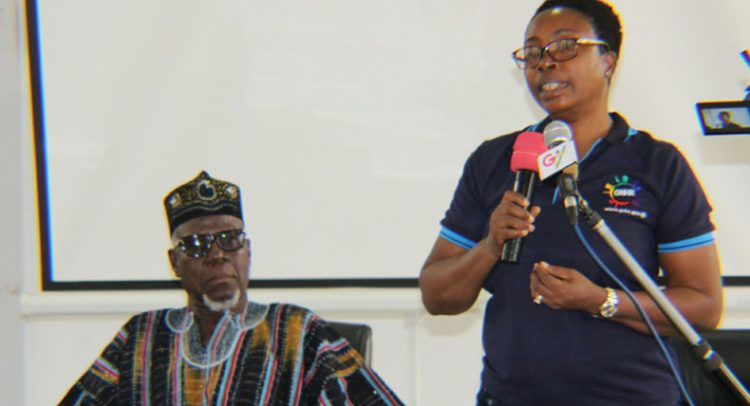Dzeble (standing) and Rockson Bukari (left)
The Ghana National Households Registry (GNHR) has targeted a total of 210, 000 households across the Upper East Region to be registered by the end of March 2018. The household registration in the Upper East Region is expected to begin on February 26, 2018.
Before the actual registration commences, a field testing will be done from 19th to February 24, 2018 to ensure that, all methods and equipment, as well as personnel are ready for the Registration Exercise.
The Ghana National Households Registry has so far recruited 808 Enumerators, 135 Supervisors and 22 District Coordinators to be assigned across the region to ensure that, the targeted number of households is achieved.
Enumerators will go round to interact with household members and register them into the Register. Enumerators will request household members to identify themselves with any recognized ID Card and provide information about their Date of Birth, Education level, Occupation and household characteristics, house location, house number and a phone number.
The Ghana National Household Registry was established under Ministry of Gender, Children and Social Protection to help produce a single source National Household Register to be used by all Social Protection Programmes under the Ministry. It will also serve as a source of household data for other Ministries in need of information for national development.
The Information Service Department has been assigned the role of educating the communities on the need for the registration and why everyone should join the exercise and give only true information about themselves and their households.
At a one-day training for staff of the Information Service Department and media practitioners at Bolgatanga, Leader of the GNHR Team in the Upper East Region and Operations Specialist, Bertha Dzeble, called on Journalists and Presenters, as well as the Staff of the Information Service Department not to exaggerate the information they have been given.
According to her, the GNHR is registered with the National Data Protection Agency and so all house-hold data and bio-information about individuals will be protected and only used for national development planning and policy formulation purposes.
“Once this National Household Register is compiled, various State Institutions and Ministries working on pro-poor programmes and other developmental programmes will depend on the register. It can be used for the implementation of LEAP, the National Health Insurance Scheme, the Ghana School Feeding Programme and many others.
We need to get the communities, districts and the entire country to see the need to participate. It will help save time and money that would have been used in compiling new list and data every time.” Madam Dzeble noted.
Madam Dzeble assured that, the electronic form of data collection will ensure the integrity of the Register on completion, and will present a reliable information for National development.
“Even though the registration is not compulsory, we advise that every household should participate and get registered so that, we can get a National Household Register that covers majority of the households in the country.
In the event that a Household Head declines to be registered, the Enumerator there will have to take the name of the Head, take the GPS Coordinates of the household and indicate that the Household Head declined to be registered.” She advised.
The Upper East Regional Minister, Hon. Rockson Bukari called on the Information Service Staff and the Media to educate the public to participate in the registration and should not politicize the exercise.
“It is one programme that has been acknowledged by public agencies and partners, as most effective at targeting the poor and vulnerable in society. The programme that involves registration of households and collection of basic information on their socio-economic status will aid planning and coordination, as well as research and development in social protection.”
The Ghana National Household Registry has concluded the Registration Exercise in the Upper West Region and looks forward to have a successful registration exercise in the Upper East Region, the continue in other parts of the country.
FROM: EBO BRUCE-QUANSAH, Bolgatanga


